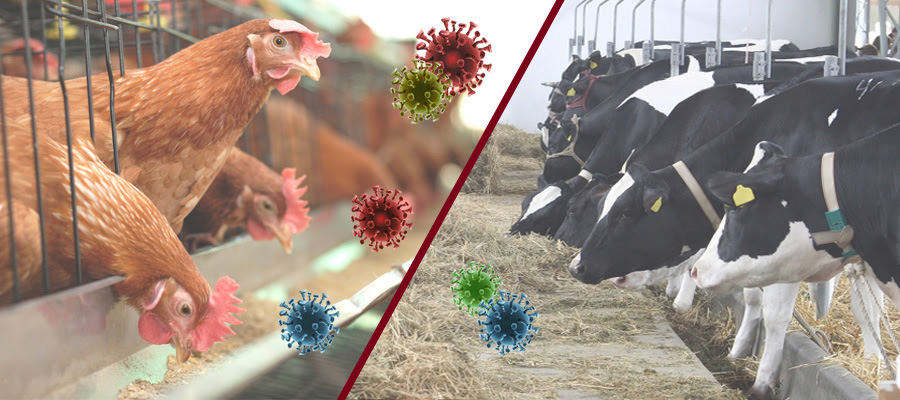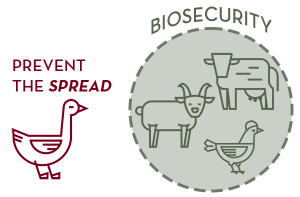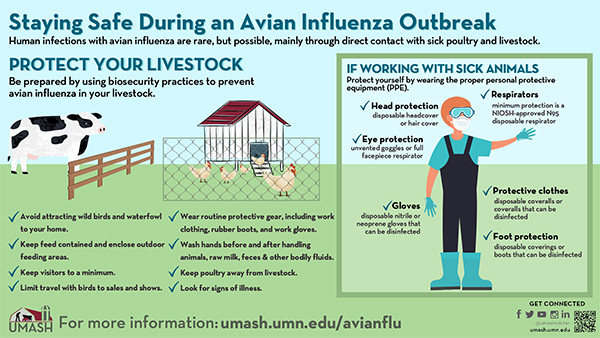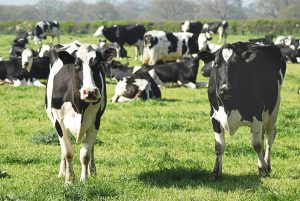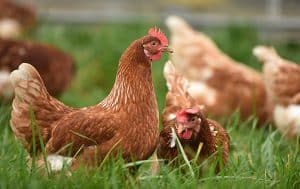Highly Pathogenic Avian Influenza A (H5N1), “bird flu” Toolkit
While the current risk of Highly Pathogenic Avian Influenza A (H5N1) to the public is low, those who handle or care for infected animals, like poultry or cattle, could be at risk of getting sick.
Updated March 2025
What is HPAI?
Highly Pathogenic Avian Influenza (HPAI), or “bird flu,” is a severe and contagious disease in birds. Often spread by wild species like ducks and geese, it is caused by avian influenza A viruses. When spread to domestic poultry such as chickens and turkeys, it can be deadly, sometimes wiping out entire flocks within days. Outbreaks often result in culling flocks, loss of income, and significant physical and mental stress for farmers and workers. HPAI requires a rapid response to keep the virus from spreading between flocks and farms.
What is H5N1 and the Current Situation?
H5N1 bird flu virus, known for causing highly pathogenic avian influenza (HPAI), has been causing illness and deaths in wild birds, commercial poultry, and backyard flocks in the U.S since 2022. In March 2024, the virus infected dairy cattle for the first time and has since spread to cattle in multiple states in the U.S. This virus has also been found in other mammals, including cats.
Since March 2024, 70 human cases of influenza A (H5) have been confirmed, involving dairy and poultry workers exposed to infected animals. However, there currently is no evidence of human-to-human spread.
The commercial, pasteurized dairy supply remains safe and risk to the public remains low. However, at-risk individuals, like workers handling sick animals, can take steps to protect themselves.
UMASH has prepared a toolkit to help poultry and dairy farmers prevent the spread of HPAI and H5N1 on their farms. It includes biosecurity protocols, guidance on recognizing avian influenza symptoms in livestock, and links to additional resources.
Please Contact Us with Questions.
How Does Bird Flu Spread to Humans?
While avian influenza A viruses, including H5N1, rarely infect humans, transmission can occur through unprotected, direct or close contact with sick or dead animals, their secretions, or contaminated surfaces. Currently, there is no evidence of human-to-human spread of the current A(H5N1) bird flu viruses.
What are the Symptoms in Humans?
Symptoms can range from mild to severe and are similar to other viruses, like the flu.
How Can I Protect Myself and Others?
If you work with animals or materials that could be infected or contaminated with H5N1 bird flu, you should take steps to reduce your exposure. Exposure can come from sick animals or their milk, feces, urine, litter, contaminated materials like bedding and straw, or raw (unpasteurized) milk. Surfaces and water like waterers, troughs, or ponds, may be contaminated with infected animal waste.
The CDC offers more specific guidelines for worker protection, PPE use, and monitoring symptoms of avian influenza (H5N1) infections in people.
AVIAN FLU (H5N1/HPAI) TOOLKIT
DAIRY RESOURCES
Be informed by learning the facts about H5N1 and latest information on avian influenza outbreaks in dairy herds.
Be prepared with a biosecurity plan. These plans, along with proper PPE, can help prevent the spread and protect your herd, and workers.
- Everyday Biosecurity (National Milk Producers Federation)
- Enhanced Biosecurity Resources for Producers (SMS Secure Milk Supply)
- Avian Influenza Guidance for Dairy Workers (UNMC Central States Center for Agricultural Safety and Health)
- Handwashing posters (UMASH)
- Recommendations for workers to prevent H5N1 and reduce the spread (CDC)
- H5N1 Bird Flu Educational Resources for Dairy Workers (National Center for Farmworker Health)
- Recorded Webinar 11/11/24: Bird Flu & Farmworkers: An Update on H5N1 During Influenza Season (Migrant Clinicians Network)
- Recommendations for employers to prevent H5N1 and reduce the spread (CDC)
- Avian Flu FAQ for Clinicians Serving Migrant and Immigrant Workers (Migrant Clinicians Network)
- Avian Flu on Dairy Farms: What Clinicians and Dairy Worker Patients Need to Know (Migrant Clinicians Network)
- Case Definitions for Investigations of Human Infection with Avian Influenza A Viruses in the United States (CDC)
- Information for Clinicians on Influenza Virus Testing (CDC)
- Prevention and Antiviral Treatment of Bird Flu Viruses in People (CDC)
- HPAI (H5N1) in Animals: Interim Recommendations for Prevention, Monitoring, and Public Health Investigations (CDC
- Considerations for Veterinarians: Evaluating and Handling of Cats Potentially Exposed to Highly Pathogenic Avian Influenza A(H5N1) Virus in Cats (CDC)
- Public Health Resources for Veterinarians and Veterinary Staff Handling Animals with HPAI A (H5N1) Virus Infection on Dairy Farms (CDC)
- Influenza – HPAI, Highly Pathogenic Avian Influenza Fact Sheet (University of Minnesota CVM Center for Animal Health and Food Safety)
POULTRY RESOURCES
Be informed by learning the facts about HPAI and latest information on avian influenza outbreaks in poultry.
- H5N1 Bird Flu: Current Situation Summary (CDC)
- Avian Influenza (definition, APHIS)
- Fast Facts (Center for Food Security and Public Health)
- Disease Images (Center for Food Security and Public Health)
Be prepared with a biosecurity plan. These plans, along with proper PPE, can help prevent the spread and protect your flock, and workers.
- Biosecurity 101 (APHIS)
- Biosecurity Planning (Poultry Biosecurity)
- VIDEO: Biosecurity Practices to Protect Your Poultry (APHIS)
- Biosecurity Checklists for Poultry (USDA, available in Spanish, Chinese, Tagalog, and Vietnamese)
- Defend the Flock Resources (USDA, available in English, Spanish, Chinese, Tagalog and Vietnamese)
- Avian Influenza Personal Protective Equipment (PPE) Guidelines
- Handwashing posters (UMASH)
- Avian Flu and Your Safety: Guidance for Dairy Workers (Migrant Clinicians Network)
- Quick Card: Avian Flu for Poultry Workers (OSHA)
- Reducing Risk for People Working with or Exposed to Animals (CDC)
- Protecting Poultry Workers from Avian Influenza (NIOSH)
- USDA “Defend the Flock” Biosecurity Page
USDA’s Defend the Flock education program offers free tools and resources to help everyone who works with or handles poultry follow proper biosecurity practices. - UMN Extension Poultry Biosecurity
University of Minnesota Extension compiles biosecurity resources for poultry operations. - Small-scale Poultry Biosecurity Videos (UMN Extension)
- Avian Influenza Basics for Urban and Backyard Poultry Owners (UMN Extension)

MONITOR ANIMAL HEALTH
Know the signs of disease and check your flock and herd daily for signs of illness. Different animals may show different symptoms –the virus is often fatal in poultry, while cows may experience mild symptoms. Workers should also self-monitor for symptoms of illness when working with sick or potentially infected animals.
Signs of Disease in Dairy Cattle:
- Common clinical signs in affected cows include low appetite, reduced milk production, and abnormal appearance of milk. (thickened, discolored)
- If you observe clinical signs in your herd consistent with this outbreak, contact your veterinarian immediately.
Quarantine Sick Animals Right Away.
Signs of Disease in Avian/Flocks:
- Sudden Death
- Lack of Energy, Appetite and Coordination
- Purple Discoloration and/or Swelling of Various Body Parts
- Diarrhea; Nasal Discharge; Coughing
- Sneezing; Reduced Egg Production and/or Abnormal Eggs
- Familiarize Yourself with Images of Avian Influenza Disease.
Quarantine Sick Animals Right Away.
![]()
REPORT SICK BIRDS AND LIVESTOCK
Know the procedure for reporting sick birds and livestock in your state, how to request testing, and what to do if workers have come into contact with infected animals. View Upper Midwest Contact info and resources below.
-
Minnesota
Minnesota Avian Influenza Hotline:
1-833-454-0156
Press 1 to report a sick domestic bird. Press 2 to report a sick or dead wild bird. Press 3 for biosecurity and general poultry management questions. Press 4 for permitting and control areas. Press 5 for all other inquiries.Dairy workers, flock or herd owners, or persons who had close contact with infected animals: Contact Minnesota Department of Health (MDH) at 651-201-5414 or 1-877-676-5414
- HPAI Mapping Tool (Minnesota Board of Animal Health)
-
Iowa
If producers suspect signs of avian flu in their animals, they should contact their veterinarian immediately. Possible cases should also be reported to the Iowa Department of Agriculture at 515-281-5305. Concerned residents both within and outside the areas affected by avian influenza are encouraged to use the Iowa Concern Hotline at 1-800-447-1985 if they have questions.
-
South Dakota
State Veterinarian: Beth Thompson
South Dakota Animal Industry Board
411 South Fort Street
Pierre, SD 57501
Ph: 605.773.3321
Fax: 605.773.5459
-
North Dakota
All bird owners, whether commercial producers or backyard enthusiasts, should continue to practice good biosecurity, prevent contact between their birds and wild birds, and immediately report sick birds or unusual bird deaths to State/Federal officials, either through the state veterinarian at 701-328-2655 or your private veterinarian.
-
Michigan
The following hotlines are available for reporting suspected HPAI infections.
DOMESTIC BIRDS:
800-292-3939 (daytime); 517-373-0440 (after-hours)
WILD BIRDS:
517-336-5030
To report a disease, contact the Department of Agriculture, Trade and Consumer Protection (DATCP) using one of the methods below to ensure the report will reach DATCP within the time limit:
Phone: 608-224-4872, Mon-Fri, 7:45am-4:30pm
Email: DATCPAnimalImports@wisconsin.gov
Evenings & Weekends: (800) 943-0003. Tell the duty officer you are reporting a potential animal disease.
VIDEOS
Guía de Influenza A (H5N1) para Trabajadores de Granjas Lecheras y Avícolas
Influenza A (H5N1) Guidance for Dairy Workers
This video from the Minnesota Department of Health provides guidance for dairy workers, including an overview of avian influenza, steps to protect yourself and prevent spread, and what to do if you suspect infection. The video is provided in Spanish. English subtitles are available.
Personal Protection Equipment Recommendations for Dairy Workers During an H5N1 Outbreak
Educators Martin J Mangual and Paola Bacigalupo Sanguesa showcase the recommended personal protection equipment (PPE) that dairy workers should use to mitigate the risk of infection while working on herds positive for the H5N1 virus.
Protección Personal Contra la Gripe Aviar Para Trabajadores de Lecherías
La educadora Paola Bacigalupo Sanguesa de la Universidad Estatal de Michigan discute el equipo y prácticas recomendadas para reducir el riesgo de infección del virus H5N1.

